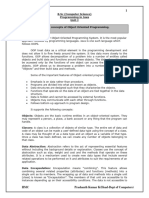0 ratings0% found this document useful (0 votes)
10 viewsThe Power of Object-Oriented Programming in Java
The document discusses the advantages of object-oriented programming (OOP) in Java, highlighting its ability to model real-world objects, promote code reusability, and enhance maintainability. Key OOP concepts such as inheritance, encapsulation, polymorphism, and abstraction are explored, demonstrating how they contribute to building robust and scalable software applications. Additionally, OOP facilitates separation of concerns, making code easier to understand, test, and modify.
Uploaded by
Ishaq RasheedCopyright
© © All Rights Reserved
We take content rights seriously. If you suspect this is your content, claim it here.
Available Formats
Download as DOCX, PDF, TXT or read online on Scribd
0 ratings0% found this document useful (0 votes)
10 viewsThe Power of Object-Oriented Programming in Java
The document discusses the advantages of object-oriented programming (OOP) in Java, highlighting its ability to model real-world objects, promote code reusability, and enhance maintainability. Key OOP concepts such as inheritance, encapsulation, polymorphism, and abstraction are explored, demonstrating how they contribute to building robust and scalable software applications. Additionally, OOP facilitates separation of concerns, making code easier to understand, test, and modify.
Uploaded by
Ishaq RasheedCopyright
© © All Rights Reserved
We take content rights seriously. If you suspect this is your content, claim it here.
Available Formats
Download as DOCX, PDF, TXT or read online on Scribd
You are on page 1/ 2
The Power of Object-Oriented Programming in Java
Object-oriented programming (OOP) is a powerful programming paradigm that has
been widely adopted by developers for building robust and scalable applications.
Java, one of the most widely used programming languages, is an object-oriented
language that supports OOP concepts. This article will explore the power of object-
oriented programming in Java and how it can be leveraged to build high-quality
software applications.
One of the main advantages of OOP is its ability to model real-world objects and
their relationships in a programmatic way. This allows developers to write code that
better represents the problem domain, making it easier to understand and maintain.
In Java, OOP concepts such as classes, objects, inheritance, and polymorphism are
used to define the structure of a program. These concepts allow developers to build
reusable
Inheritance is one of the key OOP concepts that provides developers with the ability
to create new classes based on existing classes. This mechanism allows developers
to reuse code and build new classes that inherit the properties and behaviors of their
parent classes. This reduces the amount of redundant code and increases the
maintainability of the codebase. Furthermore, inheritance enables developers to
model complex relationships between objects in a hierarchical way.
Another important aspect of OOP is the concept of encapsulation. This concept
enables developers to hide the implementation details of a class and only expose the
necessary information to the outside world. This helps to increase the stability of a
program as changes to the implementation of a class do not affect other parts of the
program. In Java, encapsulation is achieved through the use of access modifiers
such as private, protected, and public.
Polymorphism is another important aspect of OOP that enables developers to write
code that can work with objects of different types in a generic way. In Java,
polymorphism is achieved through the use of interfaces and method overloading.
This allows developers to write code that can operate on objects of different types,
such as integers, strings, and custom classes, in a generic way. This reduces the
amount of redundant code and makes the code easier to maintain.
One of the benefits of OOP is that it promotes the separation of concerns in a
program. This means that each class is responsible for a specific set of tasks, and
the interactions between classes are clearly defined. This makes it easier for
developers to understand the code and to modify it without causing unintended side
effects. Additionally, the separation of concerns in OOP enables developers to test
each component of a program in isolation, making it easier to find and fix bugs.
OOP also provides developers with the ability to build reusable and modular code.
This is achieved through the use of classes, objects, and interfaces. Classes can be
reused in different parts of a program, making it easier for developers to reuse code
and reduce the amount of redundant code. Interfaces provide a way for developers
to define common behaviors that can be implemented by multiple classes, enabling
developers to build reusable components.
Another advantage of OOP is that it supports abstraction, which enables developers
to focus on the essential features of a problem domain and hide the complexities of
the underlying implementation. This allows developers to write code that is easier to
understand and maintain, as well as reducing the likelihood of bugs. In Java,
abstraction is achieved through the use of abstract classes and interfaces, which
provide a way for developers to define common behaviors that can be implemented
by multiple classes.
The use of OOP in Java also makes it easier to write code that is scalable and
flexible. As a program grows, OOP provides a way to organize the code into
reusable and modular components. This makes it easier for developers to add new
features, modify existing features, and maintain the codebase.
You might also like
- Java Algorithms for Beginners: A Practical Guide with ExamplesFrom EverandJava Algorithms for Beginners: A Practical Guide with ExamplesNo ratings yet
- Principles of Object-Oriented Programming PDFNo ratings yetPrinciples of Object-Oriented Programming PDF17 pages
- Assignment 1 - Understanding the OOP in java - Richard C. CayabyabNo ratings yetAssignment 1 - Understanding the OOP in java - Richard C. Cayabyab4 pages
- Introduction to Object Oriented Programming Lesson 1No ratings yetIntroduction to Object Oriented Programming Lesson 13 pages
- Object-Oriented Programming (OOP) and Its Features: CopilotNo ratings yetObject-Oriented Programming (OOP) and Its Features: Copilot2 pages
- Java for Beginners: A Crash Course to Learn Java Programming in 1 WeekFrom EverandJava for Beginners: A Crash Course to Learn Java Programming in 1 Week5/5 (2)
- CSC ASSIGNMENT on Object Oriented ProgrammingNo ratings yetCSC ASSIGNMENT on Object Oriented Programming31 pages
- Java Functional Programming Made Simple: A Practical Guide with ExamplesFrom EverandJava Functional Programming Made Simple: A Practical Guide with ExamplesNo ratings yet
- Object Oriented Programming (Model Questions Sol)No ratings yetObject Oriented Programming (Model Questions Sol)31 pages
- Learning Java: A Step-by-Step Journey Through Core Programming ConceptsFrom EverandLearning Java: A Step-by-Step Journey Through Core Programming ConceptsNo ratings yet
- Oops (Object Oriented Programming System)No ratings yetOops (Object Oriented Programming System)3 pages
- Java Oops Concepts: Oops (Object-Oriented Programming System)No ratings yetJava Oops Concepts: Oops (Object-Oriented Programming System)5 pages
- Mastering Object Oriented Programming OOP in JavaNo ratings yetMastering Object Oriented Programming OOP in Java10 pages
- Java Fundamentals Made Easy: A Practical Guide with ExamplesFrom EverandJava Fundamentals Made Easy: A Practical Guide with ExamplesNo ratings yet
- Advantages/Benefits of OOP 1. Re-UsabilityNo ratings yetAdvantages/Benefits of OOP 1. Re-Usability2 pages
- Assignment 05: Wednesday 05-12-2020 WarningNo ratings yetAssignment 05: Wednesday 05-12-2020 Warning7 pages
- COMP5320 2025 Wk2 L1 RelationalAlgebra - TaggedNo ratings yetCOMP5320 2025 Wk2 L1 RelationalAlgebra - Tagged71 pages
- Data Structures and Algorithms: Thanh-Sach LE LTSACH@hcmut - Edu.vn March 31, 2020No ratings yetData Structures and Algorithms: Thanh-Sach LE LTSACH@hcmut - Edu.vn March 31, 202011 pages
- Department of IT It2301-Java Programming Question Bank: Unit I Part ANo ratings yetDepartment of IT It2301-Java Programming Question Bank: Unit I Part A6 pages
- Capgemini Technical Interview QuestionsNo ratings yetCapgemini Technical Interview Questions12 pages
- COMSATS University Islamabad: Object Oriented ProgramingNo ratings yetCOMSATS University Islamabad: Object Oriented Programing28 pages
- PPS IMP With Solution Handwriting + Program-unlocked-pages-DeletedNo ratings yetPPS IMP With Solution Handwriting + Program-unlocked-pages-Deleted38 pages
- Software Design and Architecture: Week 4 A Case Study: Designing A Document Editor - LexiNo ratings yetSoftware Design and Architecture: Week 4 A Case Study: Designing A Document Editor - Lexi38 pages
























































































